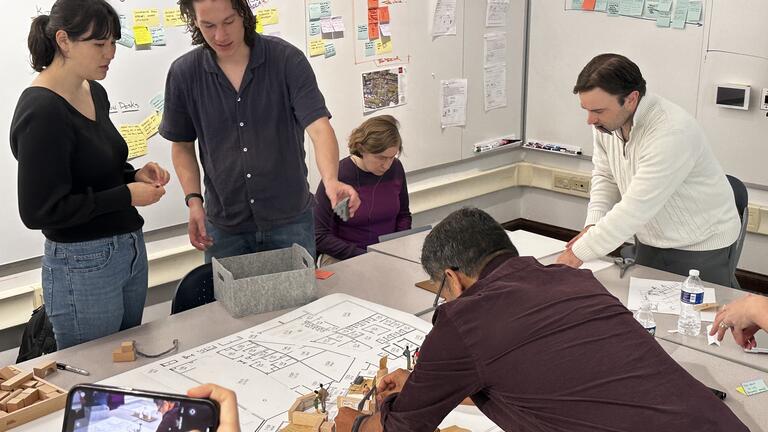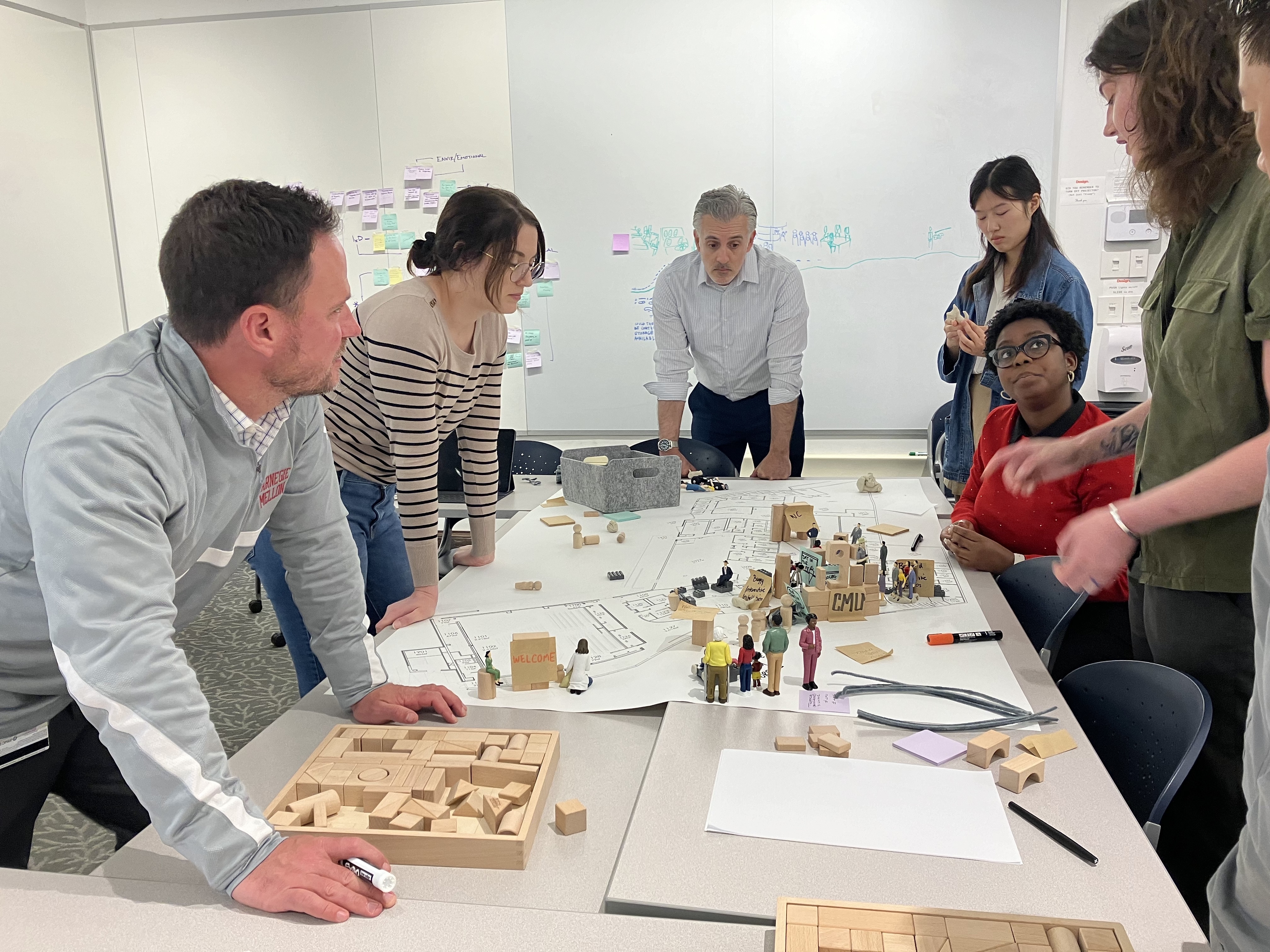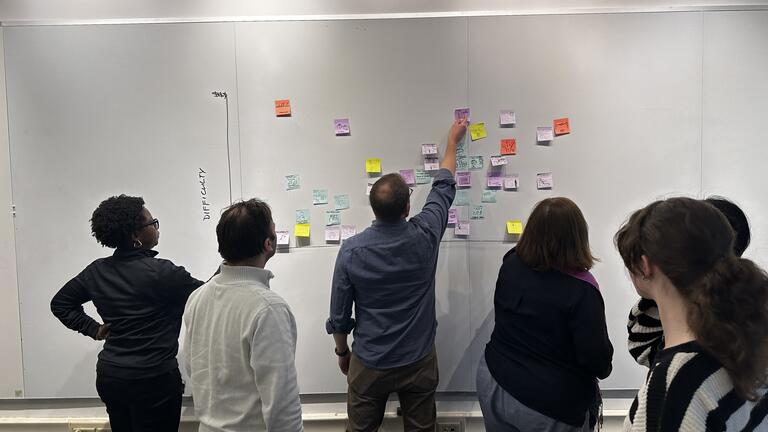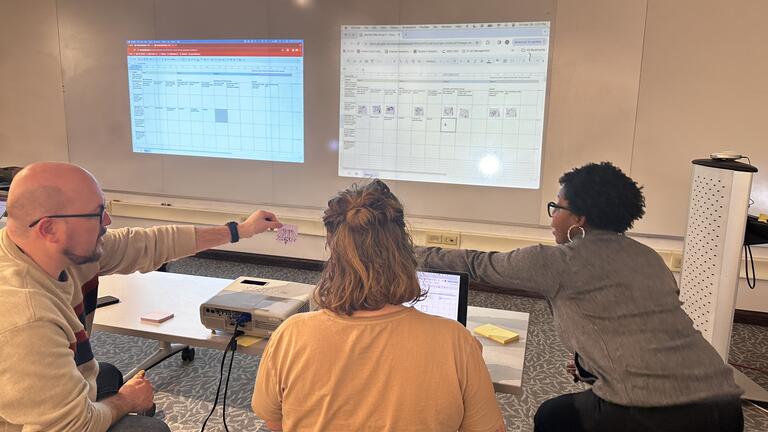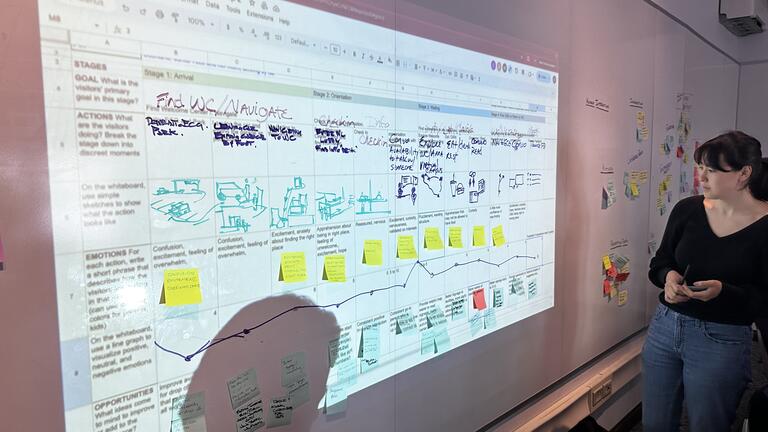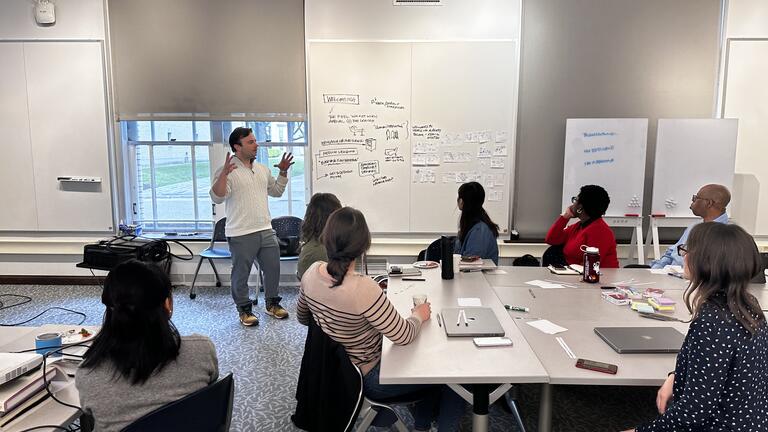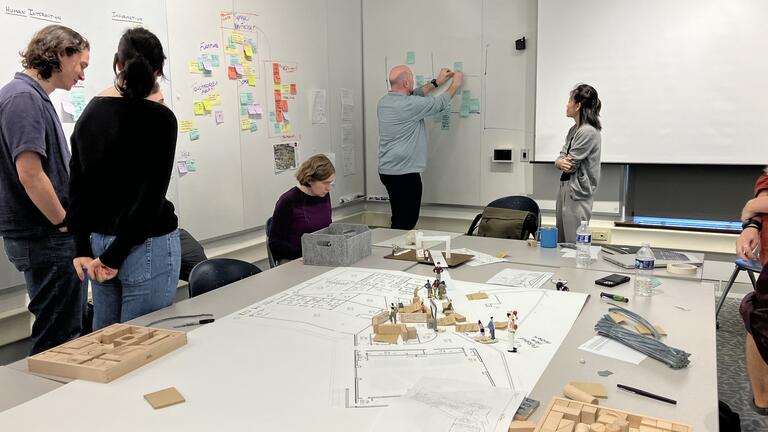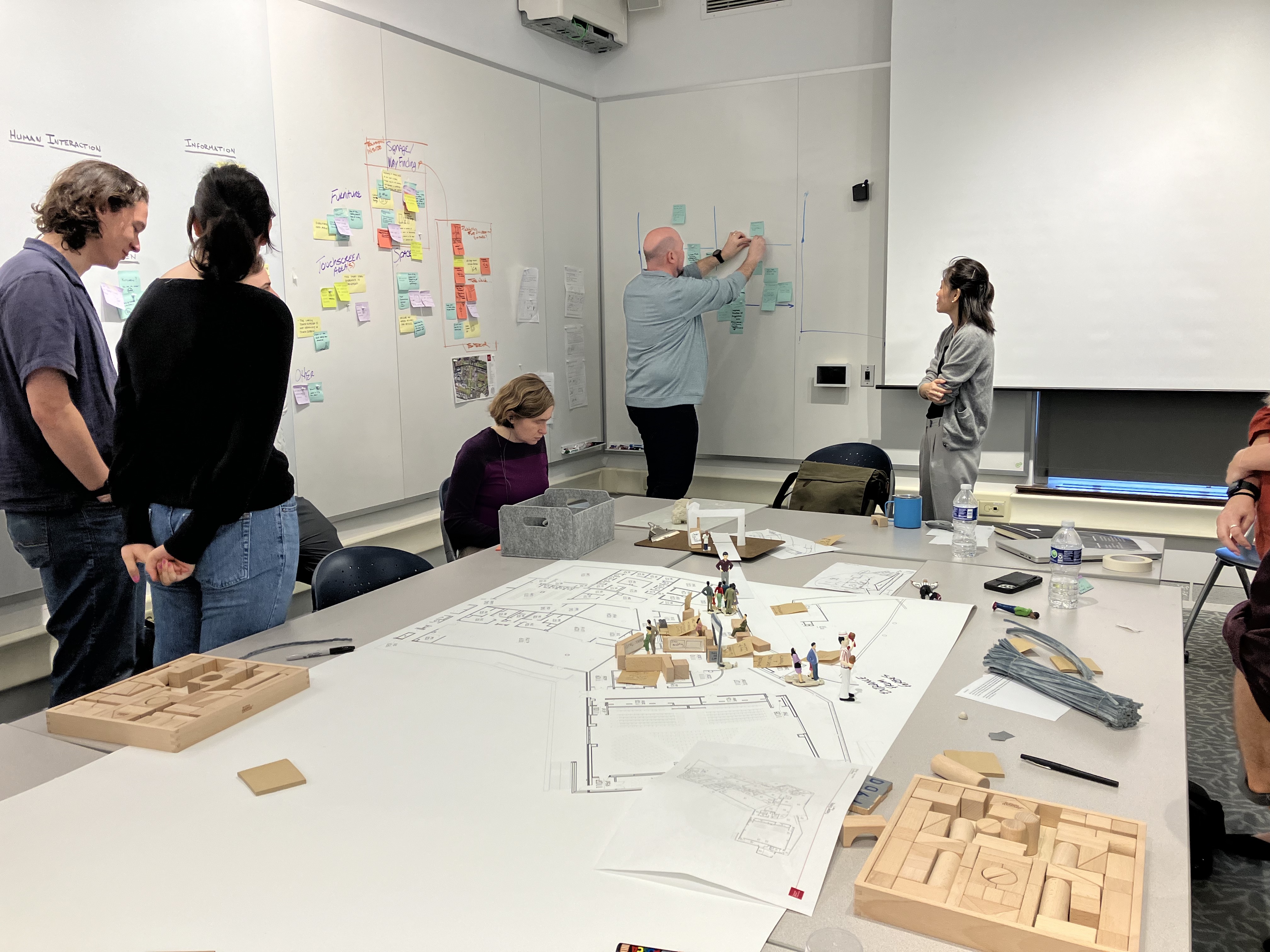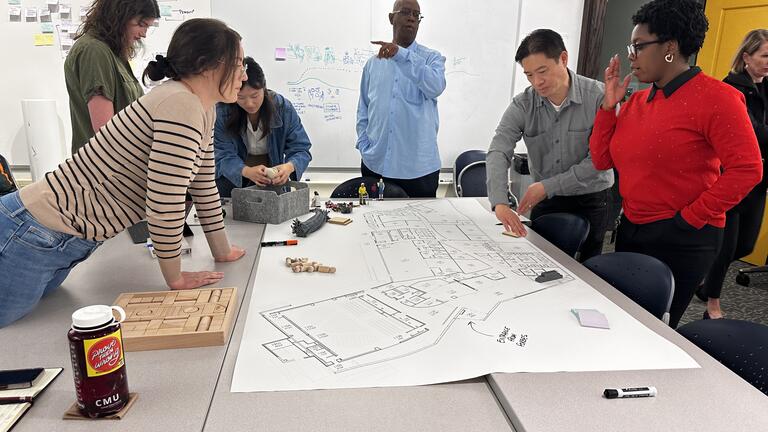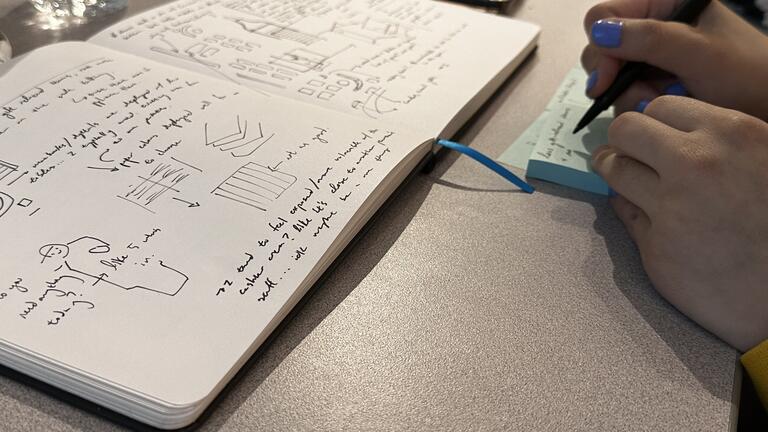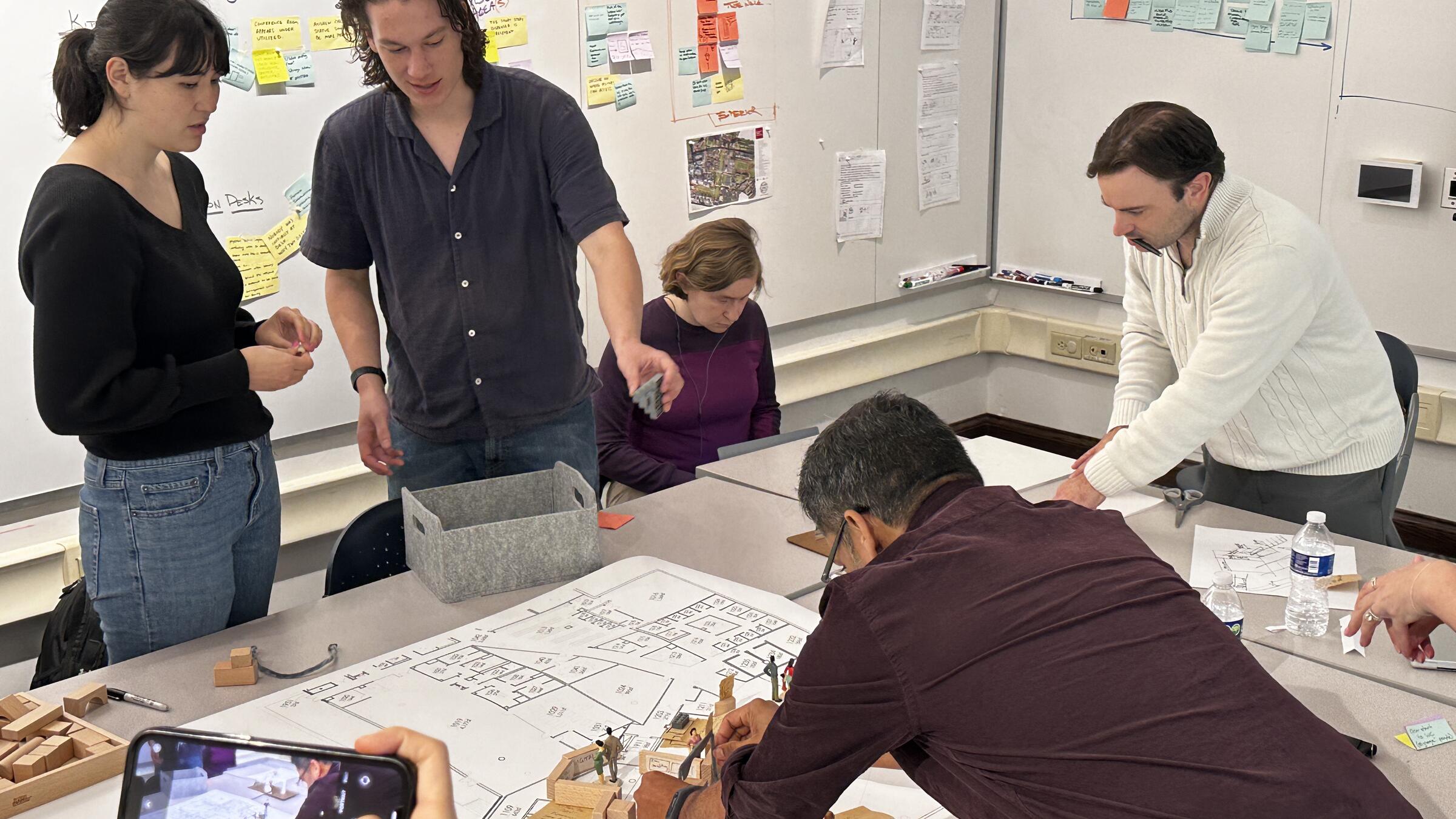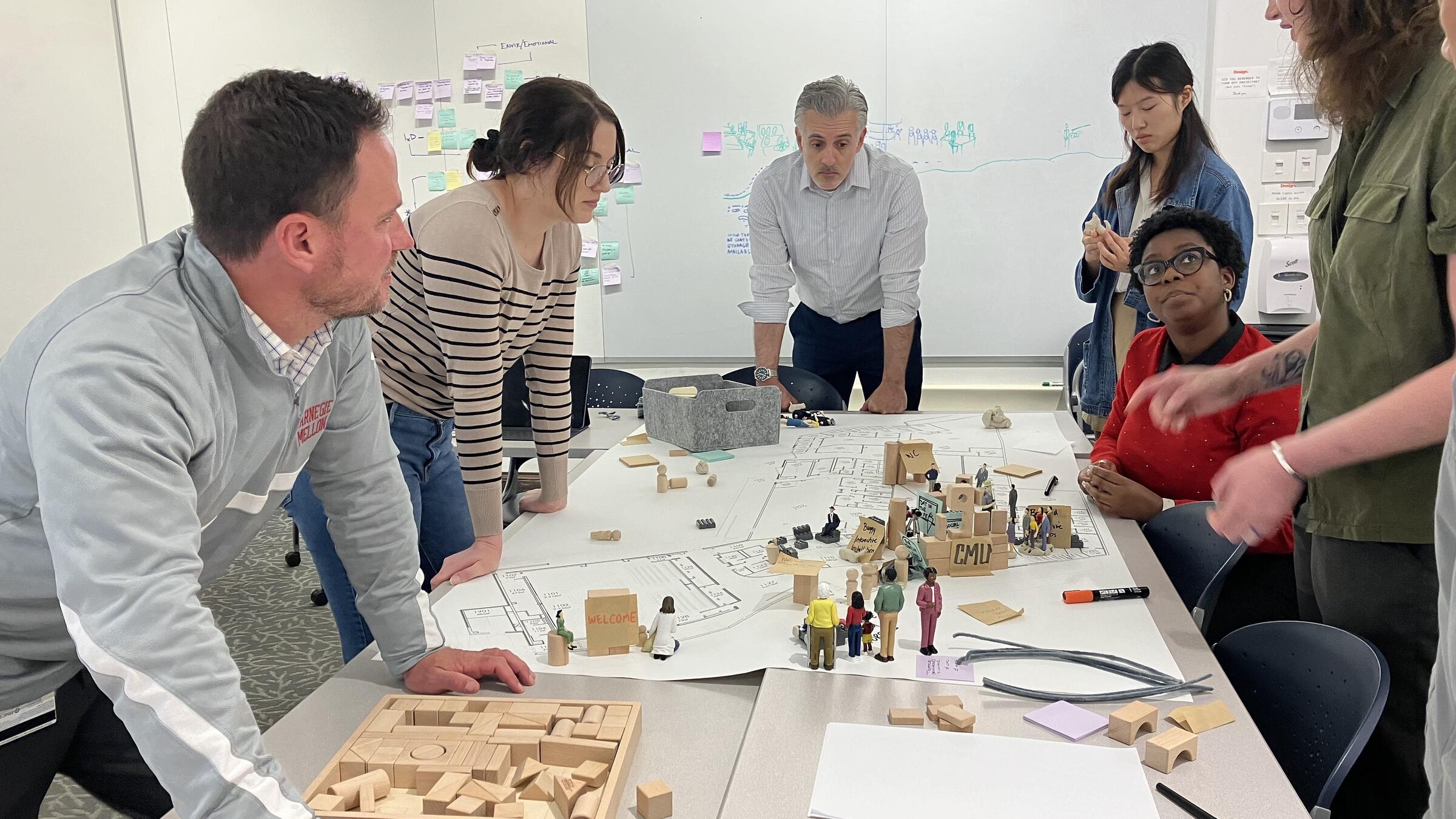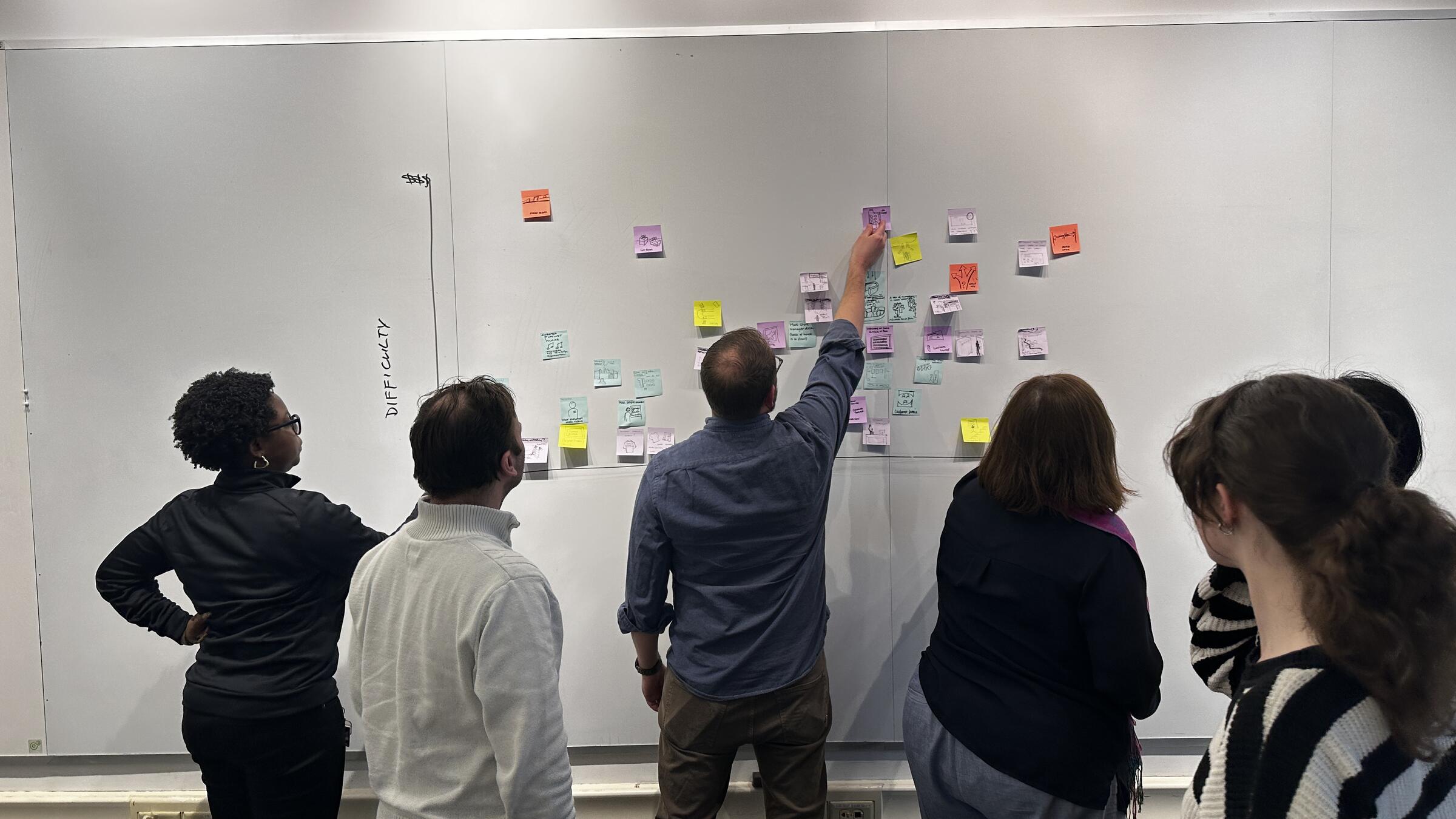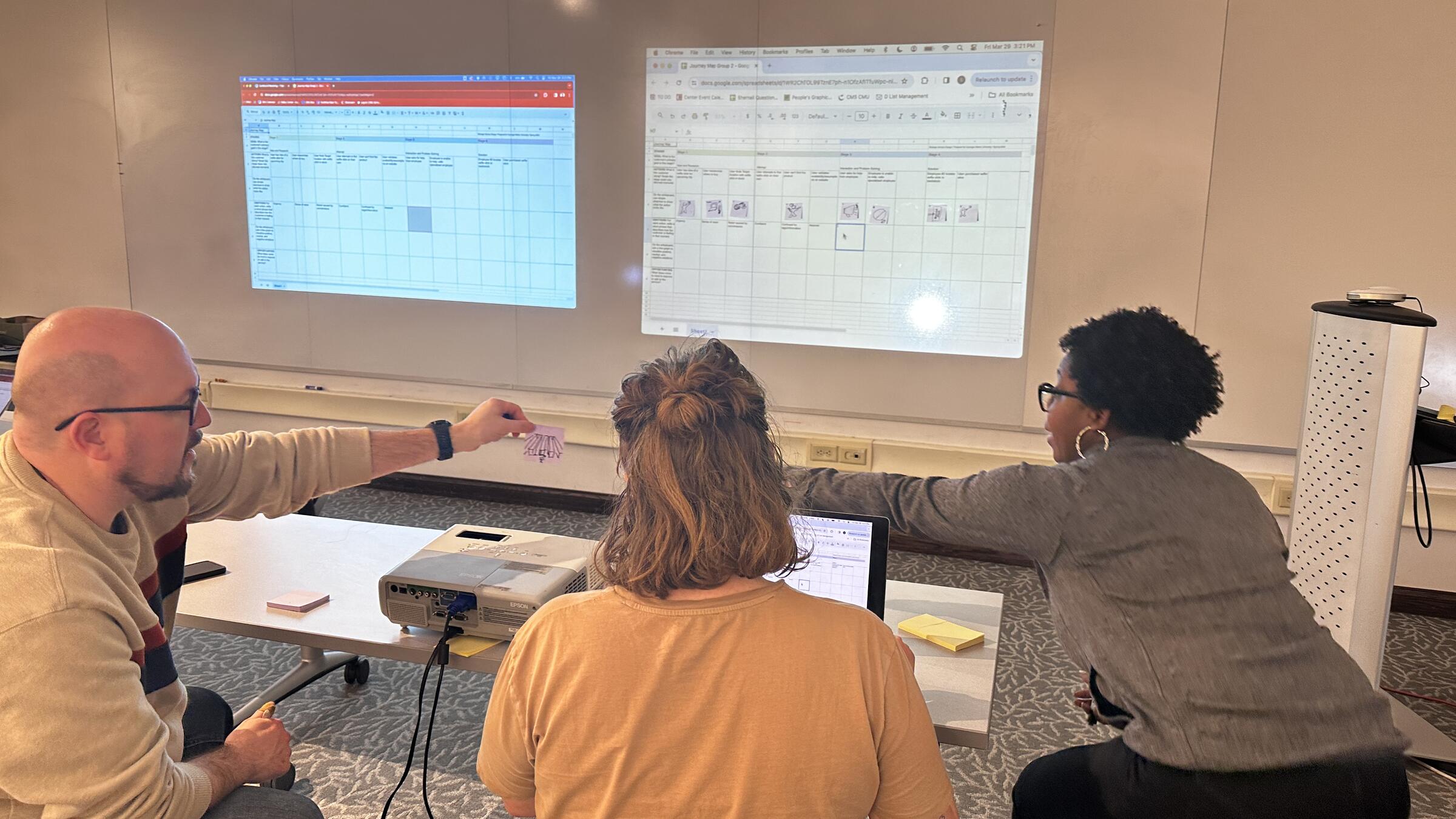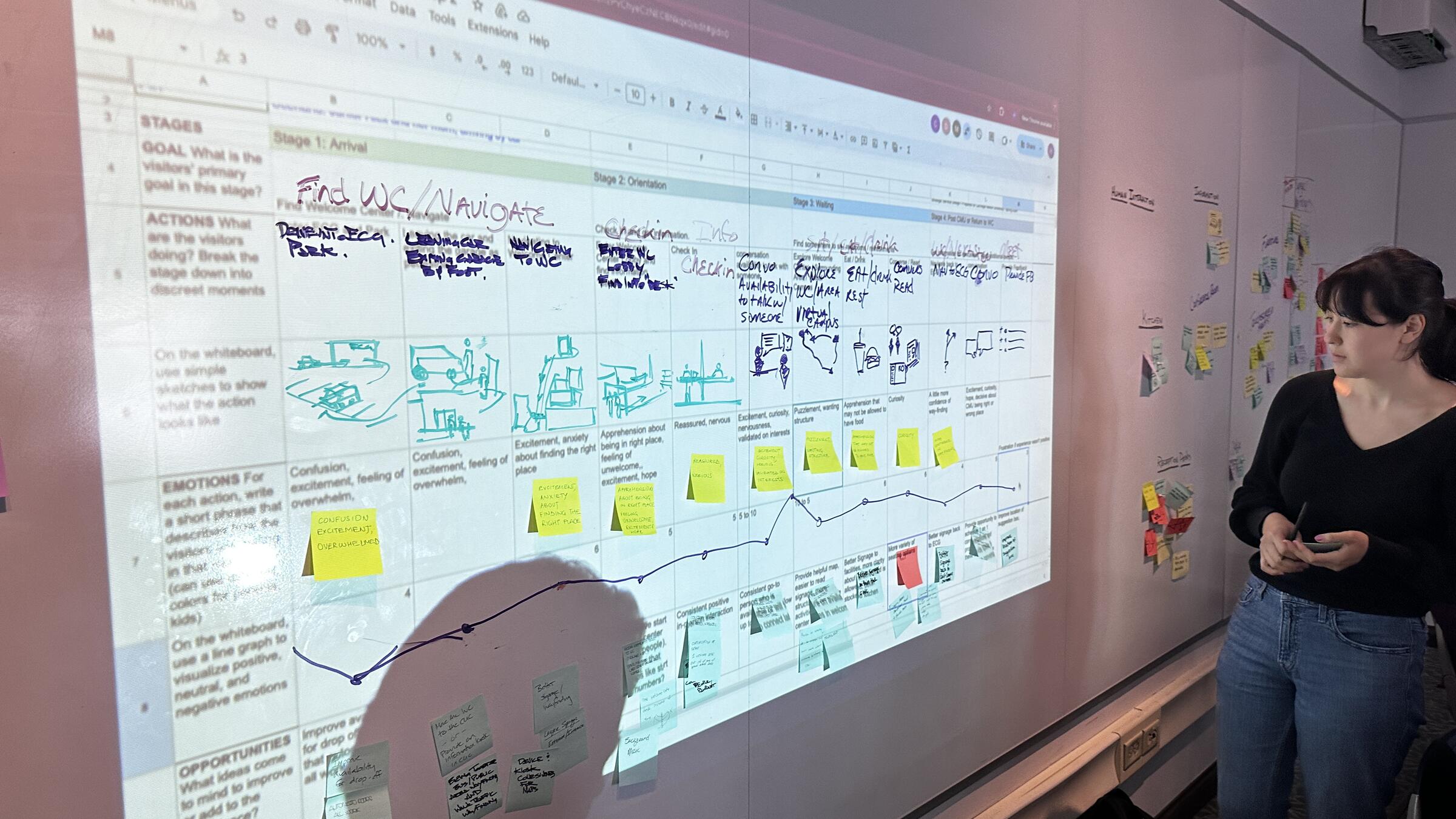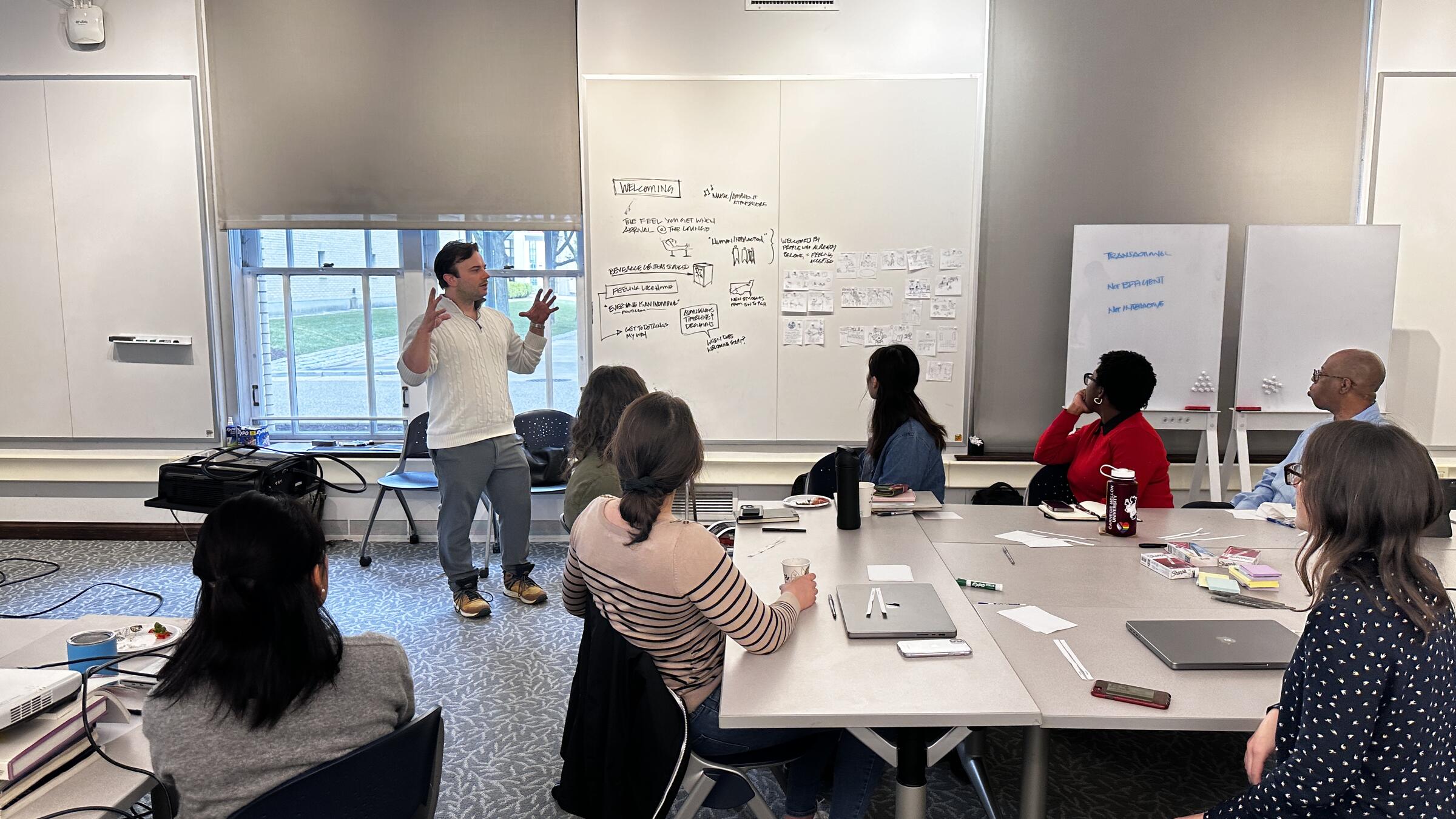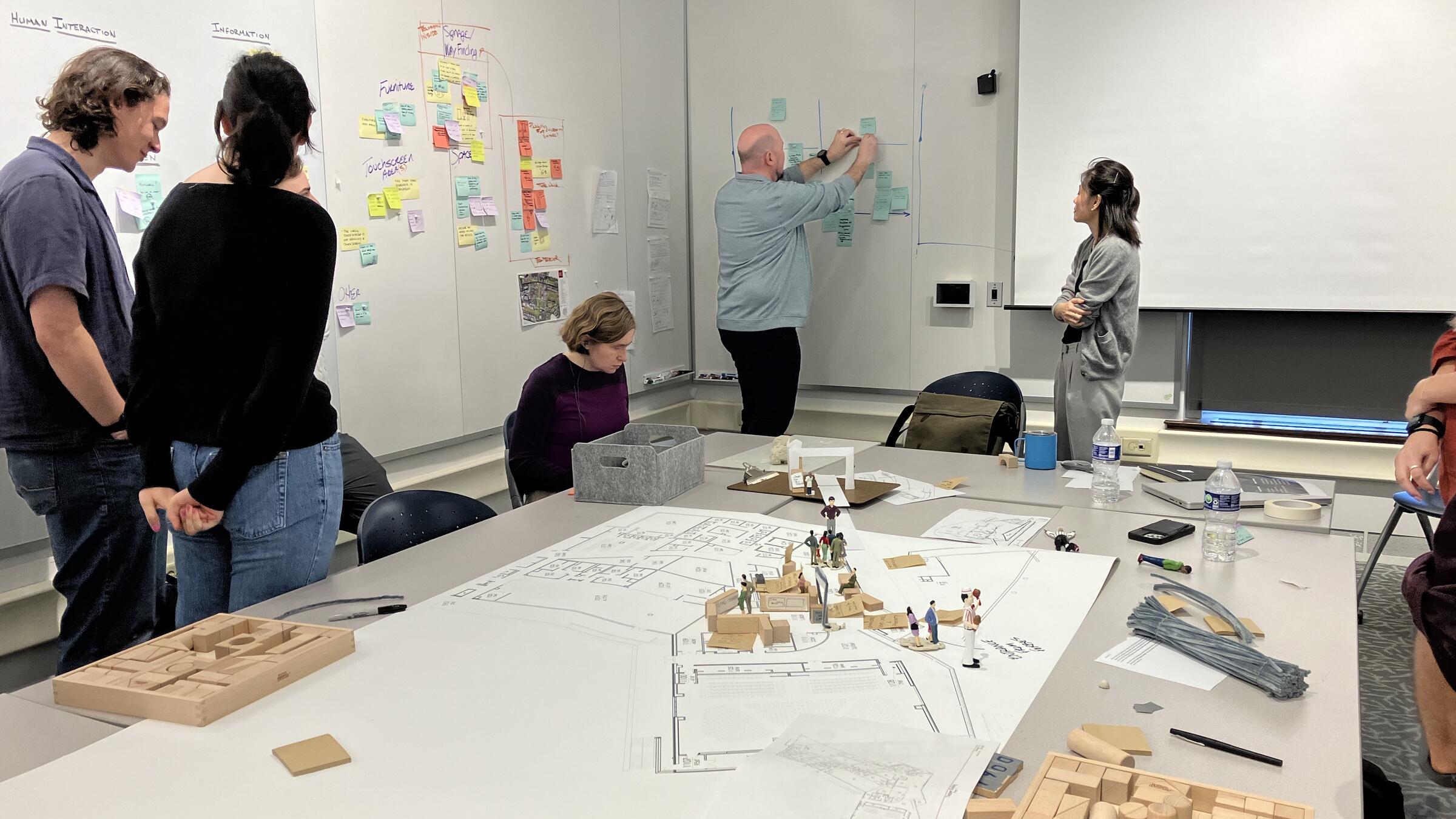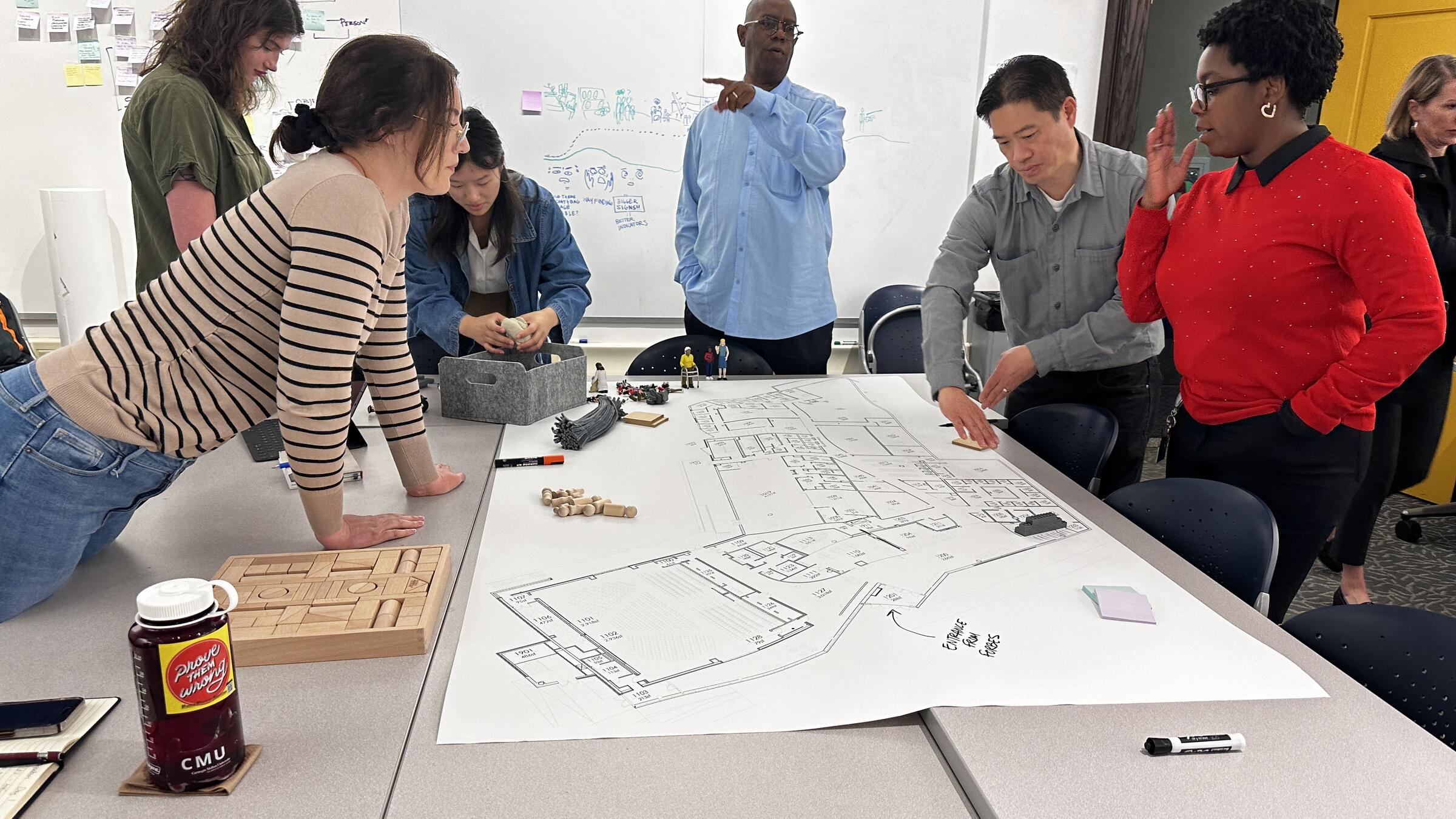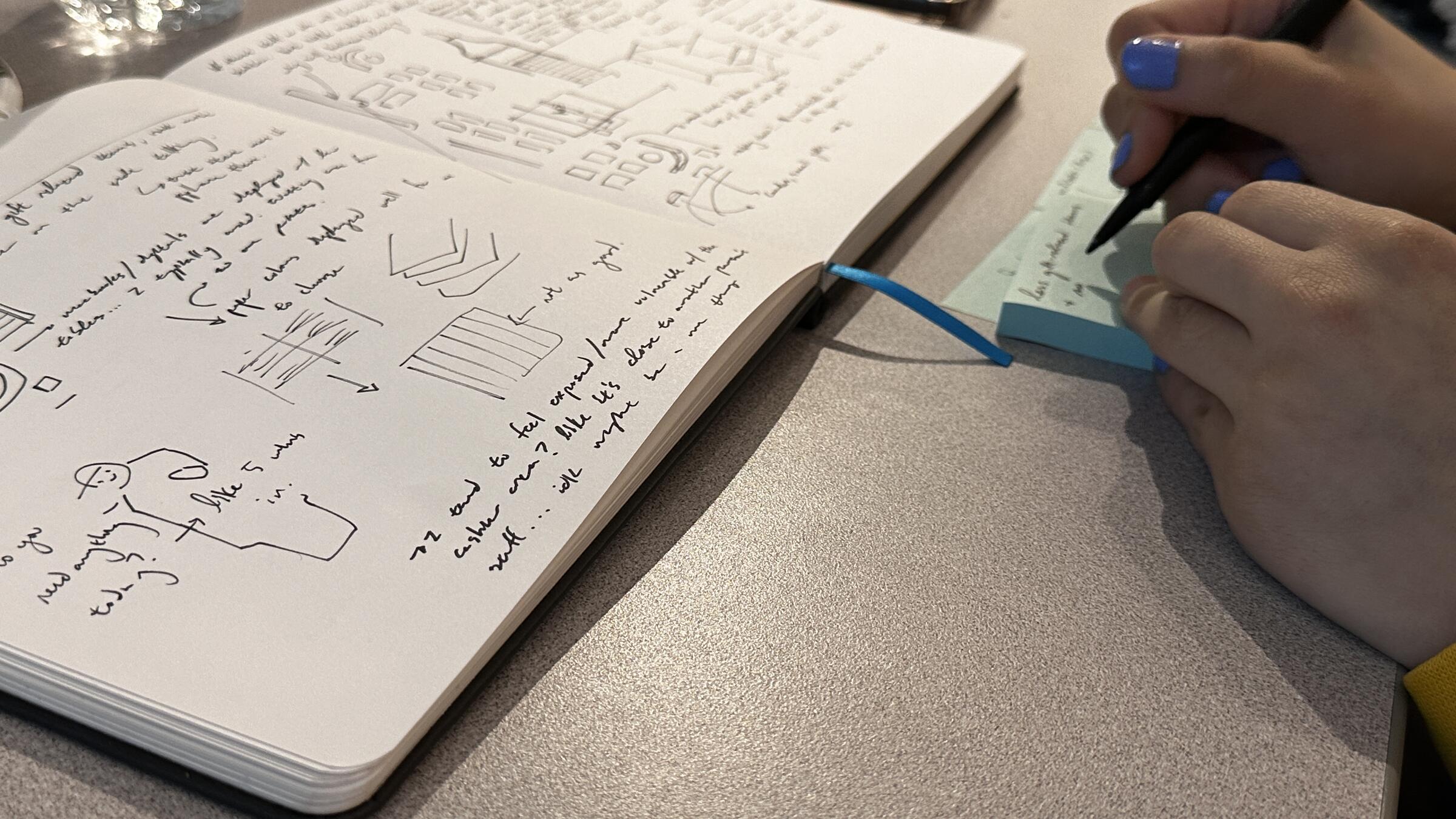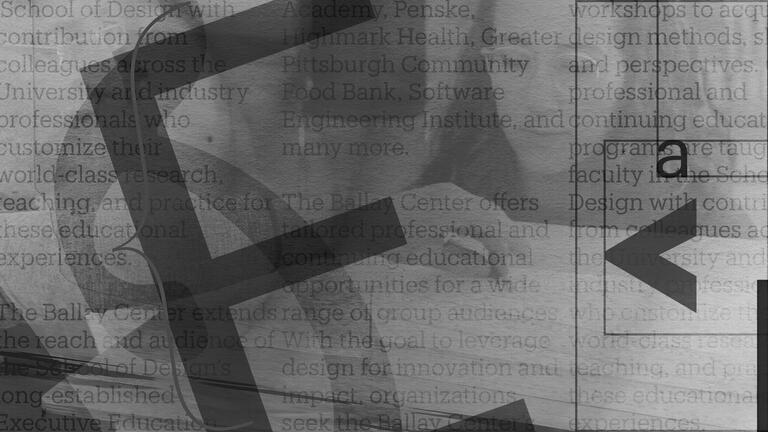
Professional Education for Organizations
The Ballay Center tailors professional education opportunities for a wide range of audiences. With the goal of leveraging design for innovation and impact, organizations seek the Ballay Center’s broad range of immersive modular workshops to acquire design methods, skills, and perspectives. Our programs are taught by faculty in the School of Design with contributions from colleagues across the University and industry professionals who customize their world-class research, teaching, and practice for these educational experiences. The Ballay Center extends the reach and audience of the School of Design’s long-established Executive Education program which has hosted programs for the United States Air Force, Penske, Highmark, Greater Pittsburgh Community Food Bank, Software Engineering Institute, Software Engineering Institute, and many more. We aim to partner with organizations that see design as an enhancement and a catalyst to achieve something new and exciting.
Engagements are modular, scalable and stackable including lunchtime information sessions, 1.5 hour intensives, 3 hour workshops, full-day, and multi-day programs all hosted within the Ballay Center or conducted on-site at your location. All short-form programming aims to develop "informed collaborators" who can enhance an organization's ability to work in cross-disciplinary ways. Long-form programs aim to develop "resident experts" who can share design processes and lead collaborative agendas within your organization.
We conduct Professional Education programs throughout the year focusing on existing industry partnerships, CMU campus divisions during Fall and Spring semesters, and reserve the Summer months for programs with new partners. At this time we are not offering our programming for individual registration. Download our Professional Education brochure.
For information about the Ballay Center’s educational programs, please contact: BallayCenter@design.cmu.edu
Modules
-
This module is aimed at building a basic visual thinking tool kit for better visual communication, leading visual meetings, and thinking through ideas. This session provides essential skills that come into play in subsequent paired modules.
Visual Thinking introduces practical skills, approaches, methods, and techniques that enhance your collaborative processes. These modules are immersive hands-on sessions that combine presentation with individual and team-based activities designed to unlock your potential for creative brainstorming through better drawing skills, visual notation, diagramming and storyboarding. We aim these sessions for both novice and expert audiences in design, business and beyond – demonstrating methods for observation, leading visual meetings, and visual explanation to support collaboration and innovation. “Drawing Ideas: A Hand-Drawn Approach for Better Design” serves as the primary resource for Visual Thinking modules. Co-authored by Professor Mark Baskinger in the School of Design, this book syncs with the unique pedagogy in the School and provides an immediate skill set to enhance design activities across our Professional Education modules.
-
This module introduces design methods for problem framing, constituent mapping, and building empathy and understanding from a human-centered perspective in order to define strategic and tactical design opportunities.
Design Methods in Action is an immersive hands-on workshop in which attendees learn by doing. Each session includes a mix of lectures, activities, and reflection, designed to go beyond step-by-step instruction and allow participants to experience the generative power of design. Participants will work in teams, modeling the non-hierarchical collaboration required for design to succeed. This learn-by-doing approach involves tackling a real design challenge, while also reflecting on how the process can be applied to any problem or situation. Armed with design opportunities exposed through research, you’ll be ready for a generative session full of ideas and collaboration. Teams will learn design-led methods for problem framing, strategic problem-solving, and concept generation. Using Professor Bruce Hanington’s co-authored book “Universal Methods of Design” you’ll learn constructive and collaborative ways of critiquing, building upon ideas, and evaluating your concepts. Finally, you’ll get an introduction to low-fidelity prototyping and start creating visual representations and artifacts you can use to test assumptions and evaluate your design.
-
This module introduces service design methods and practice for systems thinking and value creation. Hands-on activities leverage visual thinking, mapping, and research methods for strategic service proposals.
We all have an idea of what a good service is — when everything clicks into place, when you feel a little surprised and delighted because of the thoughtfulness and smoothness of the experience. And we all know too well what it’s like when a service goes wrong — when you don’t achieve what you had set out to do in the time you set aside to do it. Service Design Thinking introduces mapping and diagramming methods used to analyze and understand services, their relationships, their value exchanges, and how what happens behind the scenes impacts customer-facing interactions. Additionally, user research and prototyping methods are demonstrated to develop service experiences for both those delivering services and those receiving them.
-
This module introduces integrative studio practice that brings different domains, constituents, and programs together to generate and present concepts for transformative effect.
Design Fusion in Practice is a facilitated design sprint that compresses the research, generative and evaluative approaches of design into a studio experience. We work with you to develop a theme that complements the work of your group/organization to provide a fertile playgound to exercise your new design skills. It is of particular interst for us to develop a theme that promotes a non-hierarchical and highly collaborative atmosphere. The goal of this module is to provide a structured and phased experience with design processes to help participants identify their creative strengths and practice new ways of working together. Design processes are highly adaptable for implementation within work groups and enable individuals to work outside of their area of expertise. Working in this way provides pathways for ideas to cross domains and for teams to work toward integrative and holistic solutions on behalf of offering innovative ideas and advancing the organization.
-
Investigate and understand a problem space, user needs, and opportunities for innovation through open-ended exploration to gather qualitative insights and generate ideas that will inform and enrich your design process.
-
Concepting for Systems involves. generative and structured process of mapping, diagramming, modeling, sketching and prototyping to shape understanding of complex and dynamic social, environmental and technological systems.
-
Prototyping for discovery is the process of creating physical, visual and embodied models for exploring and understanding a problem space, user needs, user journeys, and potential solutions. Commonly used to support design processes in user experience (UX) design, product development, industrial design and more, prototyping for discovery aims for insights and ideas early in the design process to set strategy and focus.
-
Put your design skills to work in this facilitated design sprint that compresses the research, generative and evaluative approaches of design into a studio experience. We work with you to develop a theme that complements the work of your group/organization to provide a fertile playground to exercise your new design skills.
-
Understand your content, know your audience and find your message to craft dynamic and effective approaches for visual presentation.
-
Envision, plan, and prepare for what lies ahead by combining elements of foresight, strategic thinking, and design to create potential future scenarios through a balance of analytical rigor and creative thinking.
-
Through active engagement in collaborative activities, participants define problems and generate ideas for solving them by exploring and applying a design framework with strong theoretical underpinnings. This workshop teaches participants how to identify, categorize, and align current and preferred states to illuminate gaps that warrant bridging and inform design concepts.
-
Fostering an understanding of multi-faceted challenges among diverse groups of collaborators requires a thorough investigation of problem spaces, careful analysis and synthesis of their facets, and clear visual communication of whole systems. Moving through this process, workshop participants learn approaches for organizing complex information and translating it into explanatory diagrams that aid understanding.
-
While initial project ideas may emerge naturally from competitive analyses and past experiences, developing innovative approaches requires practice. In this workshop, participants will learn strategies to break free from conventional thinking by questioning assumptions, interrogating common approaches, and broadening their toolkits. This process will help elevate concepts beyond the status quo in ways that are appropriate and meaningful.
-
Innovating Under Pressure is an immersive design workshop focused on rapid development methods and viability vetting techniques. Participants tackle high-stakes challenges using accelerated brainstorming, prototyping, and iterative testing to transform raw ideas into actionable solutions. Emphasizing speed and adaptability, this workshop incorporates structured constraints to simulate real-world pressures, pushing teams to think critically and creatively under tight deadlines. Through hands-on exercises and expert feedback, attendees learn to balance innovation with feasibility, ensuring their concepts are both groundbreaking and practical.
-
There is creative genius in all of us — it just needs unlocking. Too often, though, our thinking gets stuck in familiar patterns. This session helps you unstick it by exploring three powerful modes of creative thinking: on your own, with others, and with AI. You’ll learn when each mode works best, and how to combine them to unlock game-changing ideas. Through short talks, hands-on activities, and lively discussion, you’ll practice ideation tools to overcome barriers and generate bold, audacious solutions. You’ll leave with sharper skills, expanded confidence, and a high-functioning relationship with creative thinking in all its forms.
-
We live in a throwaway culture: sneakers worn once, phones forgotten in drawers, gadgets tossed while still working. This session looks at why this happens and how design can reverse it. You’ll explore how meaning, repair, and experience can make products worth keeping, and how those same principles apply to digital services and systems. Through talks, activities, and debate, you’ll test strategies that extend product lifespans and turn the physically disposable into the emotionally durable. At the core is an "experience-heavy, material-light" design sensibility, showing how design can, and must, lead the shift from throwaway culture to cultures of keeping.
-
Waste is a design flaw. This session introduces the principles of circular design and shows how to reimagine products, services, and systems so resources stay in play. You’ll see how design decisions shape industries like fashion, food, and tech, and how new approaches can prevent waste, regenerate nature, and create value for both business and society. Through case examples and hands-on exercises, you’ll explore circular strategies that go beyond “doing less” to designing better. You’ll leave with tools and insights to spot opportunities for circularity in your own work.
-
A strategy only matters if it sticks. This session gives you a new way to design, visualize, and activate strategy using the Tetrahedron Model, developed at CMU’s School of Design. Built on the principles of “synergetics," you’ll use diagramming to map complex systems, uncover leverage points, and reimagine futures that people can actually act on. Rather than a top-down plan, this is emergent strategy — priorities and visions that come from within the organization itself. Through guided exercises, you’ll learn to co-create clarity, communicate complexity, and align teams around strategies that resonate.
-
Design always takes place within a physical environment, yet many practices still overlook how spatial conditions shape meaningful, socially aware, and contextual interaction. Learn how spatial interactions can inform the creation of next-generation products, services, and experiences in shared spaces—ranging from the home to retail, manufacturing, and entertainment. Using a relational framework of spatial human capabilities—location, proximity, orientation, locomotion, and configuration—you will gain practical strategies for designing, prototyping, and evaluating technology-enhanced experiences in real-world contexts.
-
Digital and physical realms are increasingly converging, creating opportunities to shape the future of human experiences through design. This module examines how playful, tangible, and embodied interactions can foster meaningful human connections, utilizing technology as an effective tool to bridge the digital and physical worlds. Learn design approaches for creating hybrid experiences across diverse contexts—from healthcare and education to museums, retail, and entertainment spaces. Through interactive exercises, participants will explore how to move beyond traditional screen-based interfaces to envision and design richer, more memorable interactions that shape our digital and physical future.
-
Beyond the common focus on AI for automation and efficiency lies significant potential for creative exploration in idea generation and design processes. This module explores how AI can support creative work rather than just productivity tasks, examining both the possibilities and boundaries of AI-enhanced creativity. Through interactive experiments and research-based insights, participants will explore possibilities for AI-enhanced creative work.
-
This workshop explores the intersection of improvisational performance and design prototyping. Participants will learn to apply the principles and practices of improv — spontaneity, attentive listening, and co-creation — to design processes that demand rapid iteration and group ideation. Through interactive exercises, games, and studio-based prototyping challenges, participants will practice using improv as a thinking tool, learning how to trust intuition, build on others’ ideas, and transform uncertainty into innovation. This module aims to help you develop creative confidence, collaborative fluency, and the ability to prototype concepts before they’re fully formed.
Other Engagements
-
We like to wrestle with problem spaces that are multi-dimensional and cross domains of knowledge. You bring the problem – together we explore solutions to make actionable.
Designathons serve as capstone experiences in our Professional Education programming where client leadership is joined by faculty and top performing students working together on integrated teams to generate viable problem-solving or opportunity-framing proposals. Working within a highly collaborative and creative studio setting, these events are structured to draw out your most exciting and innovative ideas.
-
The Ballay Center excels in coordinating sessions to help you analyze a problem and develop actionable next steps. Our facilitated strategy sessions provide a semi-structured space for partners to express concerns and ideas in non-hierarchical and productive ways. Employing our visual thinking skills, these sessions aim to map problem spaces, establish parameters, and synthesize multiple dimensions to form a model that promotes understanding, consensus, and action. We encourage our collaborators to schedule Facilitated Strategy Sessions at multiple checkpoints throughout our engagement in Professional and Continuing Education programs. These meetings serve to keep us in sync with your developing needs and allow you to begin employing design methods and techniques to address real-world opportunities.
This is how we help you to work the problem. Download our Facilitated Strategy Sessions brochure.
